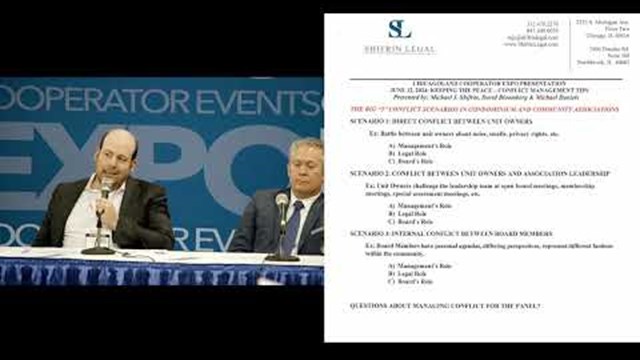If you live in a condo or a co-op, you most likely have heard the term fiduciary duty, usually in reference to the responsibilities and obligations of board members and management. But what is a fiduciary duty? In essence, it’s a legal relationship between two parties that gives one party the right to act and make important decisions on behalf of the other. Fiduciary responsibility is a cornerstone of both board and management service. Board members and managers alike must put their obligation to the corporation or association over personal gain—which means avoiding situations that could present a conflict of interest.
Simply put, a conflict of interest is a situation in which the concerns or aims of two different parties are incompatible. In a business environment such as a condo association or cooperative corporation, it’s a situation in which someone—like a board member or property manager—is in a position to benefit personally from actions or decisions made in their official capacity.
Honesty = Best Policy
“An individual involved in decision making as a board member has a unique personal material financial stake in the transaction being considered,” says Michael C. Kim, an attorney with Schoenberg Finkel Beederman Bell & Glazer, a law firm located in Chicago. “Suppose a board is considering a budget increase. Some are opposed, some in favor. Their [position] may reflect their personal financial situation. Just because a director has a personal interest in the decision doesn’t necessarily disqualify him or her [from voting]. However, if a situation or consideration is unique to the director, he or she doesn’t share the general consideration with other owners, and it could be a conflict of interest. Furthermore, if there is a transaction involving the director or the director’s family—say a contract for some type of work for the association—under Illinois law, ‘family’ includes any member of the director’s household with an ownership interest of 25 percent or more, [and it] must be disclosed. The director must notify all owners in that case of intent to do business. The owners have a right to file a petition and vote on the situation.”
“A board member has a conflict when he or she has a financial interest in the subject matter being decided,” explains Mark Hakim, an attorney with New York-based law firm Schwartz Sladkus Reich Greenberg Atlas. “Examples include a board member (or possibly someone in a board member’s immediate family) having an interest in the building doing business with a specific company, or a board member who is also a broker handling sales in the building. Such conflict must be disclosed, and can be waived by the board—but disclosure is the key. Board members must disclose their conflict, and if it’s not waived or waivable, must recuse themselves from the matter.”
Richard Brooks, a partner with law firm Marcus, Errico, Emmer & Brooks in Braintree, Massachusetts, expands further: “It’s not always as simple as it looks,” he says. “A board member may want to be involved in a multimillion-dollar request for proposal (RFP). In the past, I have explained to clients that that is not necessarily a conflict; there could just be different interests at play. In the end, it might not be a conflict of interest, but it still might not be okay.” What it really breaks down to, says Brooks, especially in a co-op or condominium setting, is who has the necessary expertise. “You need an engineer,” he says. “If the board member or the board member’s cousin is an engineer, the question then becomes: Is he qualified?”
Brooks goes on to say that “this type of situation is not automatically a problem—if the board member discloses it, and if the recommended person or entity fits the bill for what the board is looking for.” This could pertain to a board member, a contact of a board member, or even a division or subsidiary of a managing agent’s firm or a brokerage company as well. “If a board member is the best snow plow guy you can get and the price is competitive, let him do it,” says Brooks. “As long as it’s on the up-and-up. If he charges a premium—well, that’s a problem.”
A Matter of Optics
While boards and their advisors should definitely be on the alert for actual conflicts, the pros also stress that even the appearance or perception of conflict can be as toxic as the real thing. Hakim says that while it may be perfectly okay to hire a board member’s second cousin to re-tile the lobby if that board member recuses him- or herself from the decision-making process around the project, “the optics often do not play well with concerned shareholders and unit owners—so we often suggest disclosing that relationship prior to a vote to approve the company.”
“In Illinois, an ownership interest by a manager, director, or a family member is automatically a ‘problem,’” stresses Kim. “This comes up more in smaller associations where it’s hard to find contractors who want small jobs. In addition, management companies often have vendor subsidiaries. There are situations where this may be a problem, too. It’s even more problematic when a company seeks to steer business to a particular vendor to get a direct remuneration. Actions of this type must be fully disclosed.” Indeed, legal pros agree that a policy of full transparency and disclosure around these contracts not only reduces the likelihood of self-dealing, but also goes a long way toward maintaining an atmosphere of trust and accountability between boards and the residents they serve.
Truth or Consequences
In addition to being thrown off the board, “if a board member breaches their fiduciary duty, they can be sued for it,” says Brooks. “You must disclose any potential conflict. Don’t hide it—it will smell bad, and it will eventually blow up in your face. Remember that when everything looks good and there’s a job well done, no one cares. It’s when it goes the other way—and particularly when there is already unrest in a community—that it can be a political problem.”
Brooks says that conflicts can also become an issue between boards and management companies. “It usually happens when a management company owns another company that does, say, maintenance work, and they refer the self-owned subsidiary [for a project in a client community] without disclosing that relationship to the community. Inside dealing always looks bad.
“Conversely,” Brooks continues, “boards often don’t understand that most outside vendors will not bid on a $150 job. If no one else will do it, the management company will do it, but may not disclose it. For a board, the fact that they couldn’t find anyone else to do the job becomes secondary to the fact the manager didn’t disclose it. This often happens with brokerage divisions as well.”
Undisclosed conflicts of interest, when eventually disclosed or discovered, can be one of the biggest bones of contention between residents and their board-management teams, because it goes hand in hand with both a building’s finances, and the trust that residents place in the people running the building. “It can easily destroy the trust that the board member has earned,” says Hakim. “It can raise questions about his or her ethics and disrupt the daily operations of the board.”
“The potential negative result of conflicts of interest by directors goes to the fiduciary duty of the directors—particularly loyalty,” adds Kim. “Directors must always be seeking the best interest of the association. If they permit a conflict of interest to taint the relationship, they are in danger of repercussions, including removal from the board of directors. In Illinois, these matters are usually put out to the ownership for a vote. If you don’t have that option, recourse is fairly limited and may involve legal action. That’s expensive. As mentioned previously, the alternative is a political solution, you can remove a director.”
“It’s a bit more difficult when the conflict of interest is with the managing agent,” Hakim continues. “Managing agents are entrusted to assist in the operation of the building and are expected to do so with the building’s best interest in mind. It’s not uncommon for a management company to use preferred vendors or contractors to help obtain the best prices for the building. However, undisclosed interests and kickbacks will certainly not sit well with the building, and are likely illegal given the agency/principal relationship that exists. To avoid any gray areas, all new management agreements should include a clause prohibiting conflicts of interest, kickbacks, and gratuities. Managing agents should have the building’s best interest at all times.”
The expectation from shareholders and unit owners is that the board and management of their building or HOA will always be thinking of the property and its residents first. Maintaining trust between boards, owners, and management requires full disclosure, which can quiet concerns when a board member or management company offers what might appear like an inside deal. As always, transparency and accountability are key.
AJ Sidransky is a staff writer/reporter for CooperatorNews, and a published novelist. He can be reached at alan@yrinc.com.










Leave a Comment